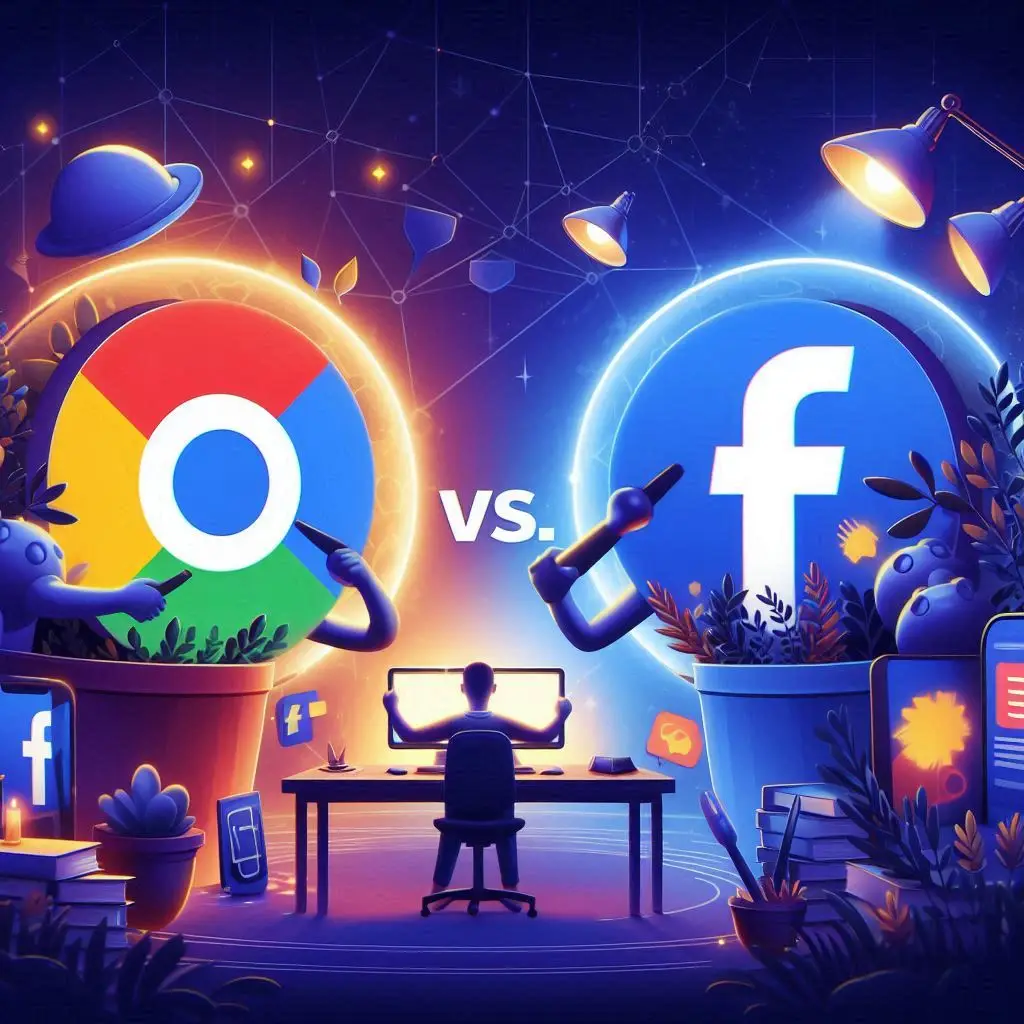Google Ads vs. Facebook Ads: Which One to Choose?
Facebook Ads do tend to be more cost-effective, especially for businesses with smaller budgets, and they excel in precise audience targeting. On the other hand, Google Ads can reach a broader audience due to the sheer volume of searches conducted daily, though they often come with a higher price tag.
In the ever-evolving landscape of digital marketing, businesses are constantly seeking the most effective platforms to reach their target audience. Two of the most prominent advertising platforms are Google Ads and Facebook Ads. Both have their unique strengths and features, making the choice between them a critical decision for any business. This article delves into the differences, pros, and cons of Google Ads and Facebook Ads to help you determine which platform is best suited for your business needs.
Understanding Google Ads
Google Ads (formerly known as Google AdWords) is Google’s online advertising platform that allows businesses to create and display ads to potential customers who are actively searching for products or services. Here are some key aspects of Google Ads:
Reach and Visibility: Google is the most popular search
engine globally, with over 3 billion searches per day. This vast reach allows
businesses to target a high-intent audience actively looking for specific
products or services.
Ad Types: Google Ads offers various ad formats, including
text ads, display ads, shopping ads, and video ads. The most popular are the
text-based search ads that appear on search engine results pages (SERPs).
Targeting Capabilities: Google Ads primarily relies on
keyword targeting. Advertisers bid on keywords relevant to their business, and
ads are displayed based on these keywords’ relevance and the bid amount.
Cost and Budgeting: Google Ads operates on a
pay-per-click (PPC) model, meaning businesses only pay when someone clicks on
their ad. This model allows for flexible budgeting, with no minimum spending
commitment.
Pros of Google Ads:
High Intent Audience: Ads are shown to users actively searching for related products or services.
Wide Reach: Access to a vast audience through Google Search and its Display Network.
Measurable Results: Detailed analytics and reporting tools to track ad performance.
Cons of Google Ads:
Cost: Competitive keywords can be expensive, making it challenging for smaller businesses with limited budgets.
Complexity: Managing Google Ad campaigns can be complex, especially for beginners.
Ad Blindness: Some users may ignore or overlook paid ads, potentially reducing visibility.
Understanding Facebook Ads
Pros of Facebook Ads:
Precise Targeting: Advanced targeting options based on user data.
Engagement: High potential for user engagement through likes, comments, and shares.
Cross-Device Visibility: Ads are optimized for both mobile devices and desktops.
Cons of Facebook Ads:
Smaller Reach: While Facebook has a large user base, its reach is smaller compared to Google’s search engine.
Ad Fatigue: Users may become desensitized to ads due to frequent exposure.
Privacy Concerns: Increasing scrutiny over data privacy may impact ad targeting capabilities.
Comparing Google Ads vs Facebook Ads
When deciding between Google Ads vs Facebook Ads, it’s essential to consider your business goals and target audience. Here are some key comparisons:
Audience Intent:
Google Ads: Targets users with high intent, actively searching for specific products or services.
Facebook Ads: Targets users based on demographics and interests, ideal for brand awareness and engagement.
Ad Formats:
Google Ads: Primarily text-based search ads, with additional options for display, shopping, and video ads.
Facebook Ads: Visually driven formats, including images, videos, carousels, and slideshows.
Targeting Options:
Google Ads: Keyword-based targeting.
Facebook Ads: Demographic, interest, and behavior-based targeting.
Cost and Budgeting:
Google Ads: Pay-per-click model, potentially higher costs for competitive keywords.
Facebook Ads: Generally more budget-friendly, with flexible budgeting options.
Which Platform Should Your Business Use?
The choice between Google Ads vs Facebook Ads ultimately depends on your business objectives and target audience. Here are some scenarios to help guide your decision:
Use Google Ads if:
Your goal is to capture high-intent customers actively searching for your products or services.
You have a higher budget to bid on competitive keywords.
You want to leverage the vast reach of Google’s search engine and display network.
Use Facebook Ads if:
Your goal is to increase brand awareness and drive engagement on social media.
You have a limited budget and need cost-effective advertising options.
You want to target specific demographics and interests based on user data.
In many cases, businesses can benefit from using both platforms in tandem. By leveraging the strengths of Google Ads and Facebook Ads, you can achieve maximum visibility, increase leads and sales, and find new customers. A well-rounded digital marketing strategy often includes a mix of both to capitalize on their unique advantages.
Understanding Facebook Ads
Facebook Ads are displayed on the Facebook platform, which boasts over 2 billion monthly active users. This platform allows businesses to create and manage campaigns with user-friendly tools and track their performance through detailed reports. Key aspects of Facebook Ads include:
Reach and Engagement: Facebook’s extensive user base provides access to a diverse audience, making it ideal for businesses looking to increase brand awareness and drive engagement.
Ad Types: Facebook Ads offer a variety of ad formats, including image ads, video ads, carousel ads, and slideshow ads. These visually driven formats are designed to capture users’ attention.
Targeting Capabilities: Facebook Ads leverage user data to provide precise targeting options. Advertisers can target audiences based on demographics, interests, behaviors, and more.
Cost and Budgeting: Facebook Ads are generally more budget-friendly compared to Google Ads. The platform also offers flexible budgeting options, allowing businesses to control their ad spend effectively.
Pros of Facebook Ads:
Precise Targeting: Advanced targeting options based on user data.
Engagement: High potential for user engagement through likes, comments, and shares.
Cross-Device Visibility: Ads are optimized for both mobile devices and desktops.
Cons of Facebook Ads:
Smaller Reach: While Facebook has a large user base, its reach is smaller compared to Google’s search engine.
Ad Fatigue: Users may become desensitized to ads due to frequent exposure.
Privacy Concerns: Increasing scrutiny over data privacy may impact ad targeting capabilities.
Comparing Google Ads and Facebook Ads
When deciding between Google Ads vs Facebook Ads, it’s essential to consider your business goals and target audience. Here are some key comparisons:
Audience Intent:
Google Ads: Targets users with high intent, actively searching for specific products or services.
Facebook Ads: Targets users based on demographics and interests, ideal for brand awareness and engagement.
Ad Formats:
Google Ads: Primarily text-based search ads, with additional options for display, shopping, and video ads.
Facebook Ads: Visually driven formats, including images, videos, carousels, and slideshows.
Targeting Options:
Google Ads: Keyword-based targeting.
Facebook Ads: Demographic, interest, and behavior-based targeting.
Cost and Budgeting:
Google Ads: Pay-per-click model, potentially higher costs for competitive keywords.
Facebook Ads: Generally more budget-friendly, with flexible budgeting options.
Which Platform Should Your Business Use?
The choice between Google Ads vs Facebook Ads ultimately depends on your business objectives and target audience. Here are some scenarios to help guide your decision:
Use Google Ads if:
Your goal is to capture high-intent customers actively searching for your products or services.
You have a higher budget to bid on competitive keywords.
You want to leverage the vast reach of Google’s search engine and display network.
Use Facebook Ads if:
Your goal is to increase brand awareness and drive engagement on social media.
You have a limited budget and need cost-effective advertising options.
You want to target specific demographics and interests based on user data.
In many cases, businesses can benefit from using both platforms in tandem. By leveraging the strengths of Google Ads vs Facebook Ads, you can achieve maximum visibility, increase leads and sales, and find new customers. A well-rounded digital marketing strategy often includes a mix of both to capitalize on their unique advantages.
In conclusion, both Google Ads vs Facebook Ads offer powerful tools for businesses to reach their target audience. By understanding the differences,
pros, and cons of each platform, you can make an informed decision that aligns with your marketing goals and budget.
Whether you choose one or both, effective use of these advertising giants can significantly enhance your business’s online presence and drive success.



